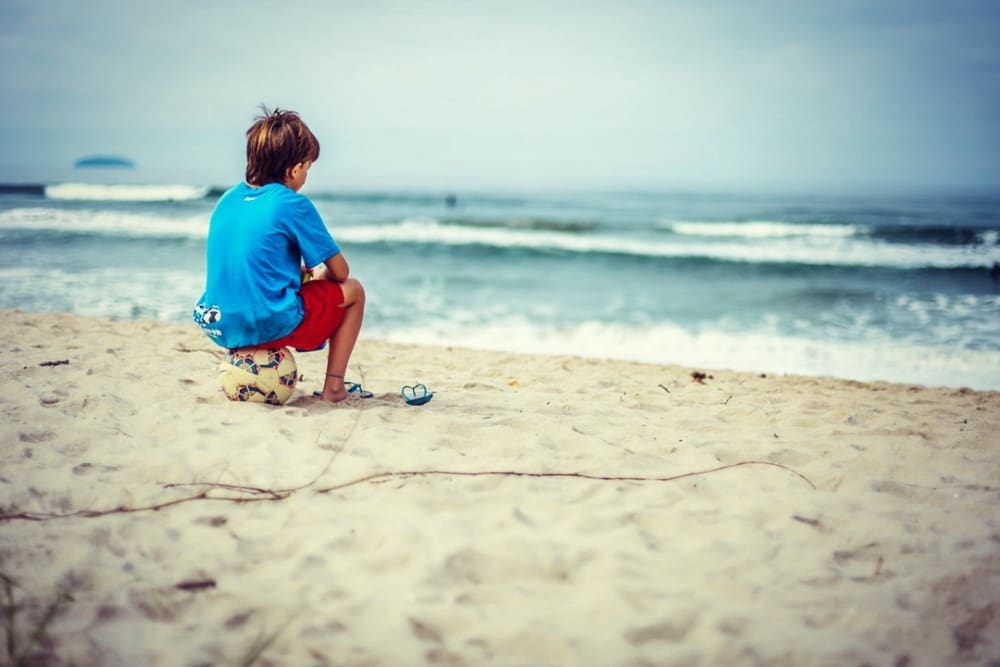When a loved one or community member dies by suicide, the entire community of survivors is powerfully affected. Children, as part of this community, may be deeply impacted and need adult guidance.
It is normal to feel nervous and uncomfortable when broaching the topic of suicide loss with children. How could it not be? Suicide is a complicated topic that brings feeling of sadness, regret and many unanswered questions. Here are a few guidelines to follow when talking with children about suicide, whether it be the death of close family member or friend, or others in your child’s sphere or community.
How to talk to children about a suicide loss.
-
Take care of yourself first.
The plane analogy is an apt one — put on your own “oxygen” mask before placing one on your child. Take a couple of deep breaths and give yourself a few moments to collect your thoughts.
-
Be aware of your own feelings.
When you talk to your child about a difficult topic, it is important to be aware of your own feelings. Suicide loss can bring of a myriad of feelings including shock, regret, sadness and more. If you are feeling, for example, great sadness, name it. “Sweetie, I need to talk with you about something very difficult and I am feeling a big sadness right now.”
-
Know your audience.
Keep in mind your child’s age and level of understanding. Younger children will need a more concrete explanation of death and suicide: “Death means the body has stopped working” and “suicide is when someone makes their own body stop working.” Teenagers can understand more of the subtleties of language, but still keep it clear. Refrain from using the term “committed suicide” and rather use the words “died by suicide.”
-
Speak about the person who died in a caring and respectful manner.
Sometimes the confusion that surrounds a suicide death leads us to sound frustrated and angry when speaking of the person who has died. While these feelings are perfectly normal, children take all of this in, and may feel as though they have done something to provoke that anger or to cause the death. Speaking respectfully of the deceased helps maintain a sense of calm and gives the child space to express their own feelings.
-
As much as possible, keep a routine and spend side-by-side time with your child.
Your child will need you around, even if he does not admit it. Yes, this is often easier said than done, as a sudden death by definition disrupts routine and often pulls adults to additional challenges and tasks. Utilize your support system to help with tasks others can do, so you can be with your children.
-
Remember, telling the truth does not mean sharing all the details at once.
Whatever you share should be factual, but does not need to be all of the available information. Use restraint in sharing. If you are unable to say “suicide” at the beginning (you are not alone in this) start with a building block of truth — “Nancy died suddenly last night…” — and then build from there. If a child has a question you don’t know how to answer, it is fine to say, “Good question. I am not sure how to answer that question at this time — but I will get back to you.”
-
Check in with your child to see what she understands.
“Kiara, I know I have explained some of the circumstances of your uncle’s death — can you tell me what you understand?”
-
If your child is on social media, do monitor their sites.
What is being shared? What kind of feedback is he receiving?
-
Help your child understand the distinction between “private” and “secret.”
For instance, if we have an upset stomach or itchy rash it is not a secret nor is it shameful, but it may be considered private. Likewise, the circumstances of a death are not a secret, but may be considered private. The farther away someone is from a family or situation, often the less information they need to know.
-
Be sure to remind the child that if they themselves ever struggle with their feelings, there is always help available.
You may want them to identify the people who are available to lend a listening ear during difficult times. It is also helpful to work with them to discover what safe activities bring them a sense of comfort and control when they are distressed, such as drawing pictures of their feelings, petting their cat, or sleeping with a beloved stuffed animal.
About the Authors: Sarah Montgomery LCSW-C and Joy McCrady LGPC

Sarah Montgomery LCSW-C is the Coordinator of Children and Family Programs at the Chesapeake Life Center at the Hospice of the Chesapeake. She has over 20 years clinical experience providing individual, family, and group counselling in a variety of settings including school-based, outpatient psychiatry and community-based organizations. She holds a BA from Williams College and an MSW from University of Maryland School of Social Work. Sarah has also co-written three books Helping Your Depressed Teenager (1994) and the Clinical Uses of Drawings (1996) and recently Supporting Children After a Suicide Loss: A Guide for Parents and Caregivers (2015) with Susan Coale LCSW-C.
 Susan Coale, LCSW-C is the Clinical Manager of Bereavement Services for Chesapeake Life Center at Hospice of the Chesapeake. A licensed clinical social worker with over thirty years’ experience, Susan has worked in a variety of settings, including hospitals, child welfare and private practice before joining Chesapeake Life Center. She was part of the team that developed Camp Nabi for grieving children and Phoenix Rising for grieving teens. Susan’s particular area of focus is working with those whose loved one has died by suicide.
Susan Coale, LCSW-C is the Clinical Manager of Bereavement Services for Chesapeake Life Center at Hospice of the Chesapeake. A licensed clinical social worker with over thirty years’ experience, Susan has worked in a variety of settings, including hospitals, child welfare and private practice before joining Chesapeake Life Center. She was part of the team that developed Camp Nabi for grieving children and Phoenix Rising for grieving teens. Susan’s particular area of focus is working with those whose loved one has died by suicide.


This article was very helpful and came to me at just the right time so I am very grateful to you for that. You do great work.